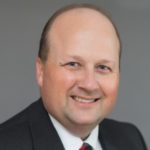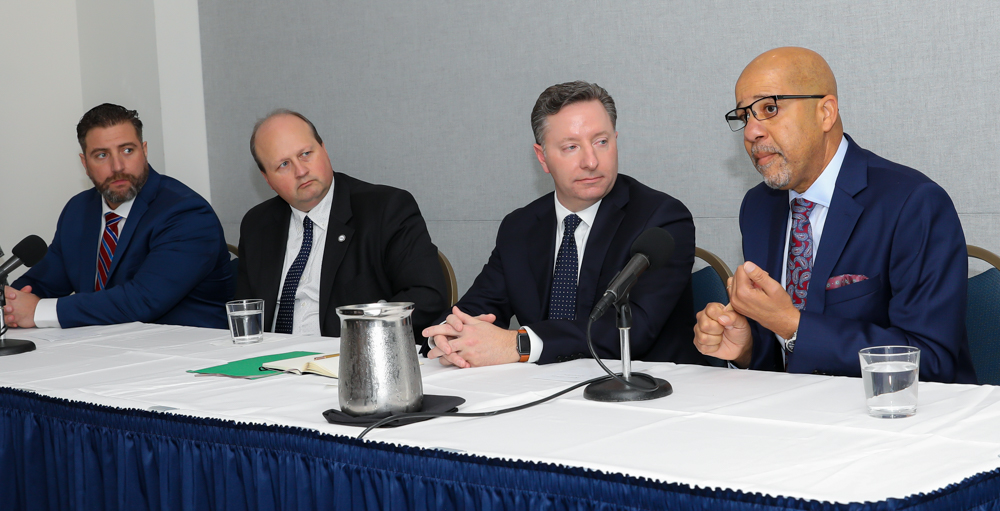Matthew Hillmann of Northfield Public Schools in Minnesota is a finalist for the National Superintendent of the Year award from AASA, The School Superintendents Association. The district has 3,800 students, and Hillmann has been in the role since 2016.
SmartBrief chatted with him to learn how he approaches his job and handles some of the bigger issues.
This Q&A has been lightly edited for clarity and space.
SmartBrief: As a former HR director, what have you seen in terms of problems with hiring teachers and staff members and retaining them?

Hillmann: It’s a supply and demand issue. You have fewer people graduating in the traditional pipeline, people who are choosing education. So that’s where you start. Why do we have that supply problem?
I do think there are a couple of things that are bigger than any one school district. One is just the tenor in which society speaks about public service, both perspective and its value. We as educators welcome criticism and welcome accountability. However, I think that it’s fair to say in society we’ve experienced a period of unfair criticism and, frankly, some mean-spirited criticism.
So if we’re trying to recruit people to a field that is the foundation of a functioning democracy, we are going to really have a problem if people can say, “I can work for X corporation, make more than what I would make in public service, and I’m not going to deal with being hypercriticized, potentially finding myself at the center of a meme that goes viral. Why would I do that?”
I do think one of the things that as a nation we need to do is to bring back a sense of respect and decorum around what it means to be a public servant.
I still get up every single day and wholeheartedly believe that what I am going to do today is not just making a difference for today, but it’s going to make a difference for people for the next several decades. … We have to recapture that narrative about the importance of public service in a democracy, and you need to have an understanding that the payback for your job is not just financial.
Surveys that are done year after year show that most people have really high levels of opinions about their public schools, but then their opinion about public education in general changes. We need to be honest about what our failings are and demonstrate that we are committed [to changing those], but we also need leaders to really speak of the power of public education. There needs to be a communicated belief that public education matters in our society.
We need to meet [potential and new educators] partway with scholarships and federal and state loan forgiveness — [that] if you commit to being in public education for a period of time, your loans are forgiven. Money does matter.
Community outreach
SmartBrief: You have a standing appearance on a local radio station twice a month. How long have you been doing this, what sparked the idea and what types of things do you typically discuss?
Hillmann: The radio station — KYMN-95.1 “The One” — is a genius thing. Superintendents [in this district] long before me went on the radio. Our radio station is innovative. They record everything and post it to the website and push it out. We started leveraging it.
Our district doesn’t have a communications department. So I go to the radio station the morning after our board meeting, we go through [what happened], and it’s an opportunity for me to do any shoutouts on things that are really good about the district, honoring any employees who have done good work.
We have an internal board update that goes out internally as a staff update with a “Here’s where you can hear the board meeting and recap.” The following week we send an update to parents and include a [link to the] board segment on that. And from time to time we’ll do special appearances about a particular topic or have other staff members go.
It’s a wonderful way to communicate with the community. It’s a great partnership. They’ve long broadcast some of our athletic events, but they’ve now moved into where they’re also doing video streaming. They have actually hired our students to produce, record and do the play-by-play of our local high-school athletic activities. They have the technology and tools [that our district can’t afford], and [it’s] something that we don’t have to manage. One of our former students who worked there won a Minnesota Broadcasters Association scholarship and is doing some play-by-play for the University of Iowa.
One of the things that we are working through right now is how to modernize and give students who work like this credit for learning. We think that this model is really the future of career and technical education, where you’re actually doing the work and you might even be being paid for it.
“Radically hopeful”
SmartBrief: Your Twitter profile says you’re an “amateur philosopher and radically hopeful.” How do those characteristics play out in your role as superintendent?
Hillmann: I went to St. John’s University in New York City for my undergraduate work, and it’s run by the Vincentian fathers, and you get to take lots of philosophy and theology at that institution. I caught the bug about thinking about thinking.
In the superintendent’s role, there’s a partial joke about how amateur philosophy is really important. Having a philosophy — some people might call it a core set of values, or a vision and your strategic commitments — is a really important thing that leaders do. So you have to determine your philosophy toward what public education is, how you create a budget or develop a program structure, and how you prioritize.
I’ve often thought the most important thing that I hire administrators on is their judgment. And judgment is a result of experience; experience is a result of decisions; and decisions are generally a result of your philosophy. So I think that it’s an important tool for any leader to be steeped in.
Then, if you’re in public education, you have to be radically hopeful. We have to see what people can be, not necessarily where they are right now. We work with children who are developing right in front of our very eyes and are trying to see what they can be, not just what they are today. We are helping them discover who they’re going to be. We’re giving them the tools and skills to be active participants in our democracy and our societies. So being hopeful about their future is important.
I think, as a school leader, being hopeful about the promise of public education is essential. Public education is a strategy of hope [for our future leaders and our democracy].
And so I think you have to be radically hopeful. It doesn’t mean that we don’t lament things from time to time or that we’re toxically positive. I wholeheartedly subscribe to the Stockdale Paradox, which is that you have to name the challenges that are in front of you, but you know that you can solve them as you move forward. It’s that mix of reality and optimism.
Top personal, professional achievements
SmartBrief: What achievement are you most proud of, and what one important achievement do you hope to be able to add to your list of accomplishments five years from now?
Hillmann: Just a couple of reflections: My grandfather went through eighth grade. My dad was the first in our family to graduate with a four-year degree. In two generations, I have a doctorate. That’s what the promise of public education can do, and I’m proud of that.
As a superintendent, the most meaningful recognition I think I’ve ever gotten was our City of Northfield Human Rights Award in 2022. Our [school district’s] Hispanic Parent Advisory Committee — we call them The Mamas — nominated me for the award. I’m the only non-Spanish speaker there. I have a long-time group of interpreters that helped me put this group of folks together. I get to hear what their perspective is, and we get to solve problems. We talk about bias, level of engagement, experiences. It’s affirming and eye-opening at the same time. About 75% of our students are white, but we have a transnational community. I like to base decisions on having as many of the community’s voices as I can. Public education is really intended to lift people from the time that they’re here as immigrants through becoming substantially rooted in this country. I think we’re able to make a difference for people. So I’m very humbled by this recognition.
A remarkable achievement for five years from now would be for the elimination of — not closing, but eliminating — the unacceptable achievement gaps we still have in our district. We’ve made a lot of improvements and have closed the graduation gap some, but Minnesota still has one of the worst achievement gaps in the country. We’re better than that.
I really think that one of the best ways to do that is through high-quality early learning, and making sure that we are getting every student in every family who wants high-quality early childhood education to be able to have that. So, five years from now, I would be grateful to have done that.
The most important thing
SmartBrief: What’s your superintendent secret sauce?
Hillmann: I think the secret sauce, so to speak, is that relationships really matter. If you are not careful, this job and the systems part of this job can take over. If you have systems without relationships, that’s where I think you end up with a lot of conflict.
Our calendar is a reflection of our values. Are we actually prioritizing making connections with people? … In our district I practice leadership every single day by walking around in a school building for 90 minutes [and building relationships]. I’m lucky I can start every day at a building.
Relationships are important because that’s what develops trust, and trust develops faith. And people have faith that you are going to do the right thing. That’s how quality culture develops.
We can talk a lot about relationships, but [it takes] real work to do it. We need to put that work in to make sure that we have those connections — whether that be by walking around at schools, making sure we’re trying to attend community events, being integrated into the community that you serve, so that you have an understanding. When you look people in the eye at the grocery store, you are really going to think through how this affects all the stakeholders and what [your decisions are] going to do for kids in the community.
Diane Benson Harrington is an education writer at SmartBrief. Reach out to her via email, Twitter or LinkedIn.
Opinions expressed by SmartBrief contributors are their own.
_________________________
Subscribe to SmartBrief’s FREE email education newsletters to see the latest hot topics in education. It’s among SmartBrief’s more than 250 industry-focused newsletters.
